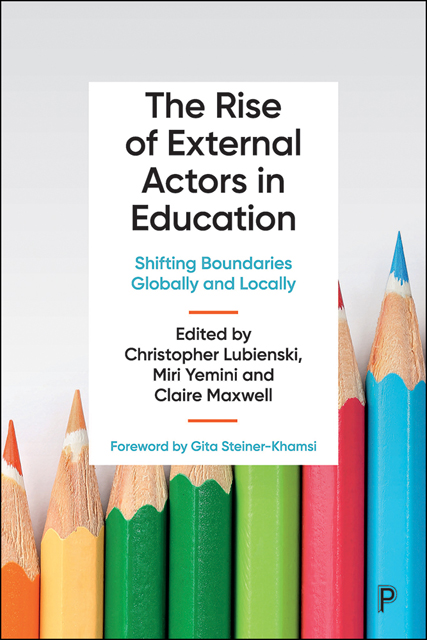Book contents
- Frontmatter
- Contents
- List of figures and tables
- Notes on contributors
- Foreword
- Introduction
- 1 Collective parental involvement: an in-between actor
- 2 When teachers become the external actor: private tutoring and endogenous privatisation in Cambodia
- 3 Cross-sectoral alliances in charter schools: the role of boards of directors from for-profit and non-profit sectors
- 4 A communitarian framework for understanding the relations between schools and NGOs
- 5 PISA for sale? Creating profitable policy spaces through the OECD’s PISA for Schools
- 6 Historical reconfigurations of internal/external actors in Danish educational testing practices
- 7 A short history of external agency involvement within education in contemporary Poland
- 8 New philanthropy in the heterarchical governance of education in Brazil
- 9 Venture philanthropy and the rise of external actors in Australian education
- 10 Power struggle in education policy change: the role of knowledge actors in structural reforms in Chile
- Conclusion: Complexity and intentionality of external actors in education
- Index
10 - Power struggle in education policy change: the role of knowledge actors in structural reforms in Chile
Published online by Cambridge University Press: 13 October 2022
- Frontmatter
- Contents
- List of figures and tables
- Notes on contributors
- Foreword
- Introduction
- 1 Collective parental involvement: an in-between actor
- 2 When teachers become the external actor: private tutoring and endogenous privatisation in Cambodia
- 3 Cross-sectoral alliances in charter schools: the role of boards of directors from for-profit and non-profit sectors
- 4 A communitarian framework for understanding the relations between schools and NGOs
- 5 PISA for sale? Creating profitable policy spaces through the OECD’s PISA for Schools
- 6 Historical reconfigurations of internal/external actors in Danish educational testing practices
- 7 A short history of external agency involvement within education in contemporary Poland
- 8 New philanthropy in the heterarchical governance of education in Brazil
- 9 Venture philanthropy and the rise of external actors in Australian education
- 10 Power struggle in education policy change: the role of knowledge actors in structural reforms in Chile
- Conclusion: Complexity and intentionality of external actors in education
- Index
Summary
Introduction
The design of education policies is currently being stressed by actors beyond the state, at the global level. For instance, transnational for-profit corporations, philanthropic institutions, international and multilateral organisations (Stone, 2004b; Mundy & Ghali, 2009; Ball & Junemann, 2012; Verger et al, 2018), social movements, non-governmental organisations (NGOs), grassroots organisations (Cortina & Lafuente, 2018), and private providers, think tanks, universities, research institutes all seek to shape and impact the definitions and characteristics of education reforms.
External actors can be understood as those that traditionally were not involved in the design of education policies. As the editors of this book posit, the boundaries between the various internal and external players in education, such as non-profit organisations, foundations, NGOs, philanthropies, parent organisations, non-institutionalised interest groups, universities, and think tanks, have become more blurred due to the multiple strategies, interventions, and networks that those actors put in place to directly and indirectly influence the shape of education policies and provision.
The influence of external actors may have negative or positive effects on educational quality and equality. On the one hand, evidence shows that unregulated privatisation of education has led to negative effects on learning outcomes and social segregation (Gonzalez, 2017; Verger et al, 2020). This movement seems to be a consequence of the increasing hostility and crusade promoted by private and for-profit organisations to delegitimise the capacity of the state to deliver quality education. On the other hand, external actors such as universities and policy research institutes may play a positive role providing evidence to support public policy making processes to improve the quality and efficacy of the state and government (Nelson & Campbell, 2017, 2019). Indeed, strengthening knowledge ecosystems that consolidate knowledge actors capable of generating new knowledge, synthesising evidence, and assessing the impact of policy innovations may provide valuable inputs to governments promoting structural reforms. This narrative has emerged from a renewed interest in evidence and scientific knowledge as key components of quality policymaking processes where knowledge actors play a substantive role in the design and implementation of education policies (OECD, 2003; Burns & Schuller, 2007).
In this context, this chapter explores the role that knowledge actors play in education policy debates on key reforms.
- Type
- Chapter
- Information
- The Rise of External Actors in EducationShifting Boundaries Globally and Locally, pp. 184 - 211Publisher: Bristol University PressPrint publication year: 2022



